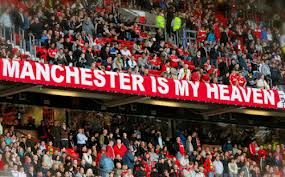By Mark Baber
April 12 – Football contributed a massive £330 million in gross value added (GVA) to Greater Manchester’s economy in 2010-11, with the global profile that Manchester receives from football worth an additional £100m a year on an advertising-equivalency basis, according to a new report just published.
‘Analysing the value of football to Greater Manchester’ has been produced by Cambridge Econometrics and the Sport Industry Research Centre at Sheffield Hallam University on behalf of a Greater Manchester partnership including Manchester City Council, New Economy, MIDAS (Manchester’s inward investment agency), and Marketing Manchester.
The report analyses how football teams in the area, including Manchester United, Manchester City, Wigan Athletic and Bolton Wanderers, contribute to the area’s economic and social well-being.
Based on the fact that total ticket sales for the 2012 London Olympic & Paralympic Games were 10.99m, while total Premier League ticket sales for the four Greater Manchester Premier League clubs in 2011/12 were 3.13m, the report states that: “Greater Manchester effectively hosts a large sporting event at least once a week during the football season, the equivalent of an Olympic and Paralympic Games every 4 seasons.”
As long as the Manchester teams continue to perform as well in the Premier League and Europe over the next 20 years their contribution to the local economy could be worth in excess of £2.5bn to the conurbation.
Sir Richard Leese, leader of Manchester City Council, said: “It’s clear that Manchester’s two table-topping Premier League clubs and its host of other clubs make an enormous contribution to the life of the city. In a global environment where we are competing with cities around the world for investment and jobs, this is an enormous competitive advantage.
“As this report makes clear, football also brings a considerable number of visitors to Manchester so whatever your allegiances the success of our clubs is a big win for our economy.”
Mike Emmerich, chief executive of New Economy, said: “Whilst we have a good measure of the impact of football through its fan base and television viewing figures, its overall economic contribution hasn’t until now been fully quantified.”
According to the report’s authors, the clubs also play a major role “in supporting and running social and community projects and educational initiatives such as Kickz. Greater Manchester’s high levels of volunteering and provision of football facilities are clear indicators that football, at all levels, provides a common ground for communities.”
The share of Greater Manchester’s economy resulting from football is considerably more than in other cities where comparable estimates have been made; in absolute terms it is approximately eight times more than estimated in Glasgow and almost six times more than the economic impact of Swansea City that was estimated in January 2013.
The report highlights the importance of TV coverage. The audience for Premier League football is the largest of any football competition in the world; the total TV audience for the Premier League in 2010/11 was 4.7 billion, compared to 3.2 billion for the 2010 World Cup with over 50% of these viewers watching Manchester United games.
The total global audience for the May 2012 Manchester derby was estimated at 600 million people, adding to the massive advertising value to ‘Brand Manchester’ provided by the clubs which is estimated as “likely to have been worth in excess of £1 billion over the 21 years of the Premier League.”
The report also analyses how internet and social media around the elite football clubs present Manchester to the world with, for instance, Wayne Rooney and Rio Ferdinand having 5.4 million and 3.5 million followers on social networks respectively.
Football is an important tourist attraction with average occupancy rates of hotels on matchdays at 85% compared to 70% on non-matchdays. The role of football in attracting tourism to Greater Manchester is also larger than in the rest of the UK with The National Football and the Manchester United Museum both playing a role.
Football also helps attract business tourism and the report recommends building on the tourist opportunities of the clubs, including packaging the stadium and museum tours with the National Football museum, and of promoting the conurbation’s football credentials to new markets. The report also praises community engagement schemes at the clubs and recommends developing Manchester’s football focused media cluster.
Contact the writer of this story at moc.l1745339890labto1745339890ofdlr1745339890owedi1745339890sni@r1745339890ebab.1745339890kram1745339890

